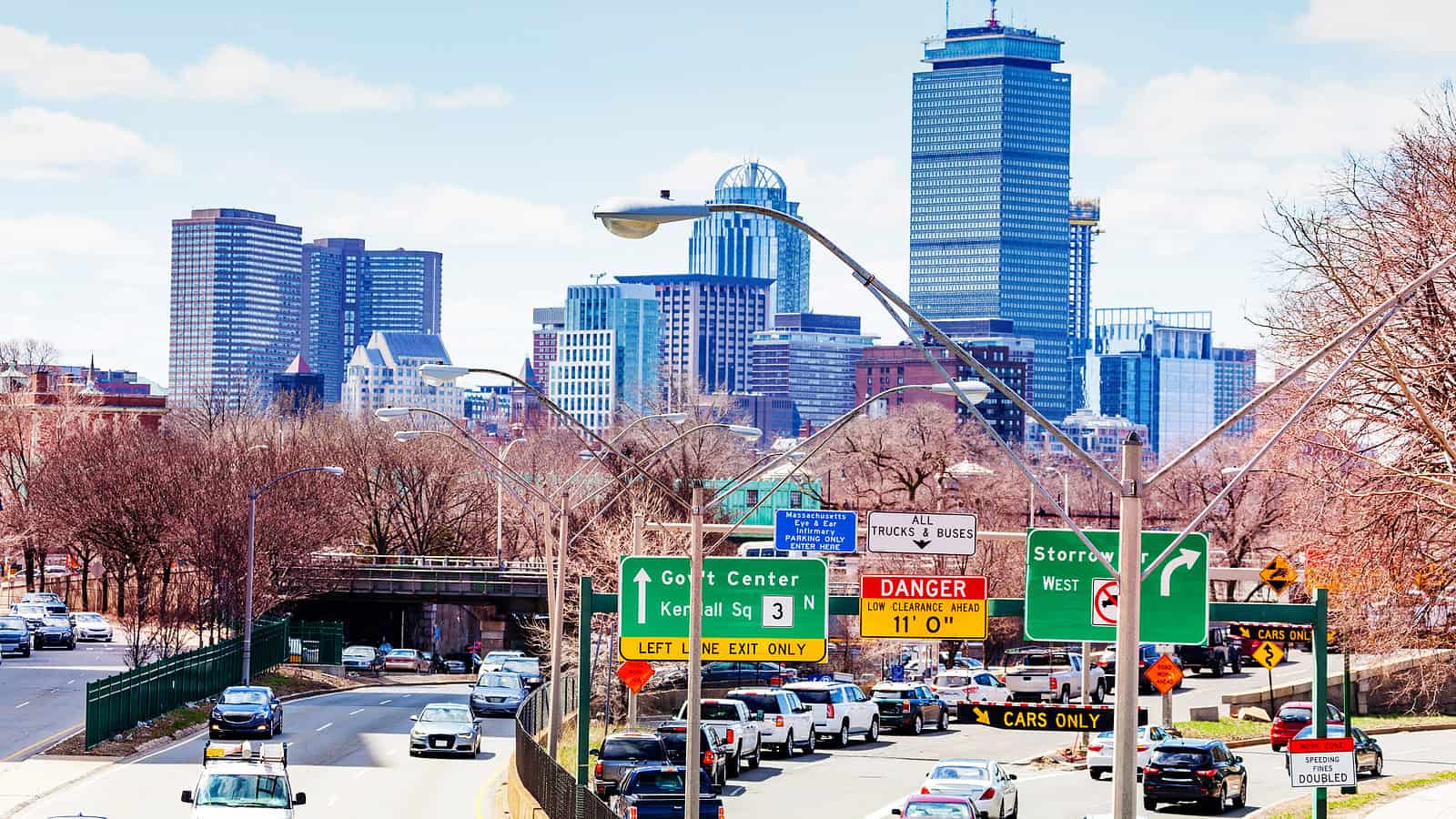
10.04.22 UPDATE: The Transportation Working Group has officially launched the 2022 MassBio Membership Transportation Survey. The purpose of this survey is to inform MassBio of the commuter-behavior of our industry to guide internal policy recommendations and public policy advocacy. This survey is completely anonymous — we do not retain contact information. Aggregated data and survey findings will be shared publicly.
Massachusetts proudly leads the nation in a number of areas: educational attainment, insurance enrollment, and biotechnology, and life sciences. Unfortunately, we also rank first-in-the-nation for traffic congestion.
Our outdated, unreliable, and unsafe transportation system is not only leaving commuters sitting in traffic, but also waiting at train stations and stranded at bus stops. The transportation crisis is stifling economic growth across the Commonwealth. Data from prior to the COVID-19 pandemic indicated that Boston drivers spend an average of 164 hours per year in traffic, costing our local economy $4.1 billion in 2018 alone.
From Boston to the Berkshires, over 106,000 individuals are employed by the life sciences industry. While work-from-home may continue for some, many employees have returned to the office. It is imperative that MassBio move proactively to chart a thoughtful, data-driven way forward as the future of work quickly becomes the present, and companies and workers alike look for guidance and bold ideas.
As the advocate for our industry on public policy issues, including statewide and regional transportation solutions, MassBio has created a Transportation Working Group to provide insight into the challenges and opportunities on this front burner topic. Their charge:
- Identify the key transportation-related challenges companies are facing.
- Share what steps companies have taken or are considering to address these issues.
- Brainstorm internal policy and public policy changes that could help to alleviate some of these challenges.
In forming this working group, we were intentional in including individuals with unique experiences and areas of expertise in order to foster creative solutions and innovative ideas. The working group includes representatives from both large and small life sciences companies; individuals from the Boston/Cambridge cluster and growing clusters across the state including Worcester, South Coast, Route 128, and North Shore; and the voices of research and development, manufacturing, incubators, real estate, and non-profits.
As an industry based on science, we know that data is key to informing our recommendations. Over 2,100 individual MassBio members completed our 2019 Transportation Survey, offering critical data and important insights to how our workforce commuted and interacted with the transportation system prior to the COVID-19 pandemic.
Now, as we face a workforce and transportation system still recovering from the COVID-19 pandemic and adjusting to realities around hybrid work, we need fresh data that reflect our current commuting patterns. This fall, the Transportation Working Group will launch MassBio’s 2022 Transportation Survey to identify the ways in which the pandemic has changed how we commute, the measures that will encourage drivers to use public transit, and how often we work-from-home. What we learn from submissions will guide the working group’s efforts to identify best practices and policies for member companies and legislative priorities for the next session.
Public policies to support transportation access across the Commonwealth may include advocating for safe and accessible bicycle lanes, more frequent train and bus service, and measures to reduce traffic congestion.
One such policy to reduce congestion was passed by the Massachusetts Legislature this session. The Mobility Pricing Commission, included in the transportation bond bill, is tasked with studying and making recommendations on strategies to alleviate rush-hour traffic congestion by tolling on certain roadways during times of day that encourage drivers to change their commuting behavior. The Commission would be comprised of 16 individuals from across the Commonwealth, including the Secretary of Transportation and representatives from regional transportation associations, business groups, and organizations that represent low-income communities.
Before signing the transportation bond bill into law on Wednesday, Governor Baker removed the Mobility Pricing Commission from the bill. Baker’s policy maneuver sends this section back to the Legislature with an amendment requesting that the commission be expanded to include “more stakeholders including representatives of the trucking, hospitality, retail, and construction industries.” The Governor argued in his amendment letter that mobility pricing adds a disproportionate cost to workers who are unable to change their shift hours.
Mobility pricing, or congestion pricing, is supported by a number of transportation and business experts. In fact, the Commission on the Future of Transportation, established by Governor Baker, recommended the policy in 2018. While the Governor’s recent move to delay the implementation of the Commission is frustrating, it marks a step forward from his decision to veto a similar Special Commission on Roadway and Congestion Pricing from the 2020 transportation bond bill.
MassBio will continue to identify opportunities to support transportation policies that will improve access, ensure safety, and modernize transit infrastructure. The voices of our individual members shape our advocacy efforts. It is important that we hear from you when we launch MassBio’s 2022 Transportation Survey.
About
Maggie Randall
Manager of Public Policy and Advocacy
As Manager of Public Policy and Advocacy, Maggie focuses on advancing local, state, and federal policies to support and grow the life sciences industry in Massachusetts. Maggie works with representatives from MassBio member companies to lead and facilitate policy working groups and position-specific roundtables.
Prior to joining MassBio in 2021, Maggie spent several years in the Massachusetts Senate, recently serving as Chief of Staff and working on legislation related to transportation, housing, and criminal justice reform. Previously, Maggie worked in Massachusetts Senate President’s Office.
Maggie holds a Master of Art in Applied Politics and a Bachelor of Science in Law and Public Policy from Suffolk University. Maggie’s graduate thesis examined voter turnout and voter accessibility through state and federal policies.
Contact Maggie to get involved with MassBio’s Roundtable and Working Groups.
